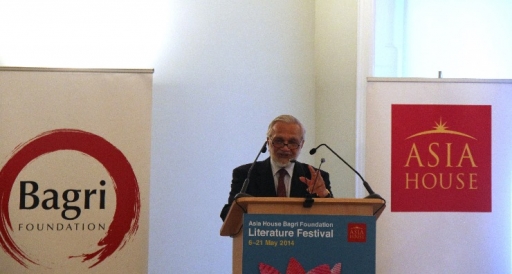Lord Bhikhu Parekh, a peer in the British House of Lords, has delivered a speech at Asia House about India’s contribution to the First World War, which he described as “greater than the rest of the Commonwealth put together”.
India – which was a part of the British Empire when the UK declared war on Germany in 1914 – saw more than a million individuals volunteerfor Britain. They served in a variety of roles, ranging from fighting on the front line to labourers.
Lord Parekh, a political theorist with an interest in multiculturalism, has penned several books, including:Colonialism, Tradition and Reform: An Analysis of Gandhi’s Political Discourse(1989);The Future of Multi-Ethnic Britain: Report of the Commission on the Future of Multi-Ethnic Britain(2000); andA New Politics of Identity: Political Principles for an Interdependent World(2008).
The peer delivered his assessment of India’s role in the First World War at the Closing Night of the Asia House Bagri Foundation Literature Festival on the 21st May 2014.
BEF “no match” for the Germans
Lord Parekh highlighted the huge amount of manpower, supplies and equipment that India provided for the war effort and cited the thousands of medals – including Victoria Crosses – which were awarded to Indian soldiers.
At the outbreak of the conflict, Britain mobilised its small, but professional army in the shape of the British Expeditionary Force, which was deployed to France.
Lord Parekh stated that the force the UK sent to the European mainland “was no match for the Germans and so Britain immediately turned to India for help”.
After initial German advances, the British and French halted the Germans and the front line stabilised, thiswould evolveinto four years of trench warfare.
This, Lord Parekh stated, was an aspect of the conflict in which Indian forces aided the British. He highlighted that the Indian experience of fighting skirmishes in the Himalayas brought skills and insights into trench warfare.
Brighton Pavilion
Brighton, on England’s southern coastline, established itself as a centre for the treatment and convalescence of Indian soldiers.
Brighton Pavilion servedas a hospital where many Indian soldiers were treated during the First World War.
Lord Parekh commented that whilst many soldiers wrote home to India about how well they had been treated, they were still subject to colonial ideas and attitudes regarding race.
“What was striking was that even in these hospitals, religious and caste rules were observed. High caste soldiers were looked after by the high caste cooks. No female white nurses were allowed to look after the wounded Indian and African soldiers”.
They did not want the Indian soldiers to get into the habit of thinking that white women were available to them in the UK, in case it had similar consequences in British India”.
Volunteer Army
Lord Parekh considered four motivations as to why Indians volunteered to serve the British (there was no conscription in British India).
He cited figures of 1.5 million Indians who answered the call to fight for Britain in a variety of different roles. Approximately, the peer stated, 80% were Muslims and Sikhs, with 20% being Hindu.
Money was a key factor for many of the poor farmers from the Punjab and Uttar Pradesh in their decision to volunteer.
Progression up the caste system attracted others. Those who fought were elevated to the caste of Kshatriya (warrior) and the accompanying prestige it bestowed both uponthemselves and their families.
Thirdly, a direct sense of loyalty to King George V, Emperor of India, rather than of a sense of affinity towards the Empire, inspired many Indians.
Finally, Lord Parekh asserted, a motivation to prove that Indians’ bravery in fighting and dying was equal to that of Europeans, spurred many on.
The role of Gandhi, who actively recruited soldiers for Britain’s war effort, was of particular interest to the peer.
He highlighted that supporting the United Kingdom in Gandhi’s view would work to India’s advantage for four reasons:
It would help facilitate independence;India had enjoyed the benefits of being part of the British Empire, so should aid the motherland when called upon;that as the conflict was fought in the name of freedom, it made sense that anyIndian seeking independence shouldsupport the side committed to upholding freedom; and that the training Indians received in the army could prove invaluable in preparing Indians for Satyagraha (fighting for the truth).
“Colossal contribution”
Lord Parekh described India’s contribution to the First World War as “colossal”, but that in many history books, it was a “marginal footnote”.
He pointed to the fact that the deeds of Indians in the conflict have been neglected in India itself:
“You dont see monuments in India commemorating the contribution of Indian soldiers to World War One.India Gate in Delhi was originally created as a monument for the First World War and then it became a symbol for all wars. No post-Independence government has thought it necessary to commemorate the Indian contribution to World War One”.
One reason for this, he argued, was that Indian historians have “no interest in military history”. Another was that the Indian public viewed those who volunteered as being motivated by money.
I think it makes British people realise what they owe to Indians. Their history was not enacted just by them. If you go back in history you see Indians, Arabs and other races all playing an important role; throughout Britains history they are as much the architects of British history, a part of British history as the British themselves.
He continued: It is important for Indians in the UK to realise our history did not begin in the 1950s. Indians have been present in the UK in some form or another for several hundred years. Its good for Indians in the UK to realise that they are part of Britains history and Britains history is ours it helps bond a society and form shared memories of mutual gratitude”.
Source: Asia House
Posted by: Daniel Barry, Centenary News
